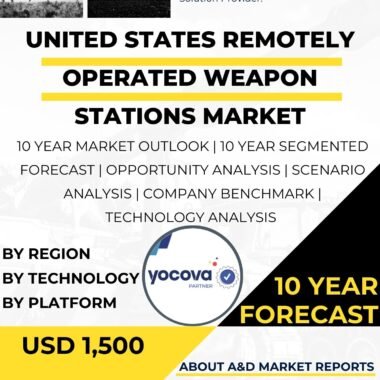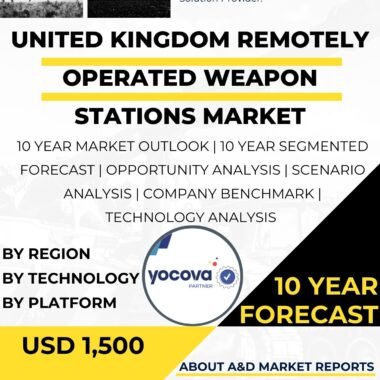Description
The Spain Remotely Operated Weapon Stations (ROWS) Market is a critical and rapidly evolving sector that plays a pivotal role in enhancing the firepower and operational capabilities of the Spanish Armed Forces. Remotely operated weapon stations refer to advanced weapon systems that are operated from a distance, typically from within a protected vehicle or structure. These systems allow military personnel to engage targets accurately and effectively while minimizing exposure to enemy fire. The Spain ROWS Market is driven by factors such as the need for increased firepower, modernization initiatives, and the growing emphasis on enhancing soldier survivability.
The growth of the Spain Remotely Operated Weapon Stations Market can be attributed to several key factors. First and foremost, the increasing complexity of defense threats and the evolving dynamics of modern warfare have necessitated the adoption of advanced weapon systems. ROWS provide the Spanish Armed Forces with enhanced firepower, precision targeting, and increased flexibility in engaging diverse threats, including enemy personnel, vehicles, and fortifications.
Moreover, advancements in technology have significantly improved the performance and capabilities of remotely operated weapon stations. Modern ROWS are equipped with sophisticated targeting sensors, fire control systems, and stabilization mechanisms, enabling accurate engagement of targets, even on the move.
The Spanish Armed Forces recognize the strategic importance of investing in remotely operated weapon stations to maintain a strong defense posture. ROWS offer the Spanish military a decisive advantage in combat scenarios, enhancing the effectiveness of infantry and armored units and providing a potent capability for asymmetric warfare.
Furthermore, the Spain Remotely Operated Weapon Stations Market benefits from collaboration and joint development programs with other European nations. Spain’s involvement in joint ROWS initiatives fosters technological exchange, cost-sharing, and interoperability between armed forces, promoting a stronger and more capable European defense ecosystem.
In addition to their applications in military operations, remotely operated weapon stations also have crucial applications in homeland security and law enforcement. ROWS can be used for border security, counter-terrorism, and critical infrastructure protection, providing law enforcement agencies with increased firepower and situational awareness.
The versatility of remotely operated weapon station technology is another significant driver of market growth. These systems can be adapted to various mission scenarios, including mounted on armored vehicles, naval vessels, or integrated into fixed defensive positions, providing the Spanish Armed Forces with a comprehensive and adaptable ROWS capability.
However, the growth of the Spain Remotely Operated Weapon Stations Market also presents challenges. One of the primary concerns is the need for continual investment in research and development to keep pace with advancements in ROWS technology. As defense threats evolve, continuous innovation is essential to ensure that remotely operated weapon stations remain at the forefront of firepower capabilities.
Moreover, ensuring the safety and reliability of remotely operated weapon stations is of paramount importance. As these systems involve high-energy weapons and complex electronics, rigorous testing and quality assurance are crucial to minimize risks and ensure successful engagements.
Another challenge lies in addressing the issue of cost-effectiveness and affordability. Remotely operated weapon stations can be expensive, and ensuring that they are affordable and accessible to the Spanish Armed Forces becomes essential for sustaining market growth.
Furthermore, the Spain Remotely Operated Weapon Stations Market must address human-machine interface considerations and training requirements. Ensuring that military personnel are effectively trained in using ROWS and that the interface between operators and the weapon station is intuitive and efficient is critical for maximizing their operational effectiveness.
In conclusion, the Spain Remotely Operated Weapon Stations Market is a critical enabler of military firepower and operational capabilities, providing advanced weapon systems for accurate and effective engagement of targets. The market’s growth is driven by advancements in ROWS technology, the changing nature of modern defense threats, and collaboration in joint ROWS initiatives with other European nations. Remotely operated weapon stations enhance the overall defense posture, operational capabilities, and survivability of the Spanish Armed Forces, providing a potent capability for engaging diverse threats with precision and flexibility. However, challenges related to technological advancement, safety, cost-effectiveness, and human-machine interface must be addressed to ensure the continuous effectiveness and resilience of remotely operated weapon stations in meeting defense requirements and supporting Spain’s strategic interests. As technology continues to evolve, remotely operated weapon stations will remain a critical aspect of modern defense strategies, shaping the future of firepower capabilities in Spain and beyond.




